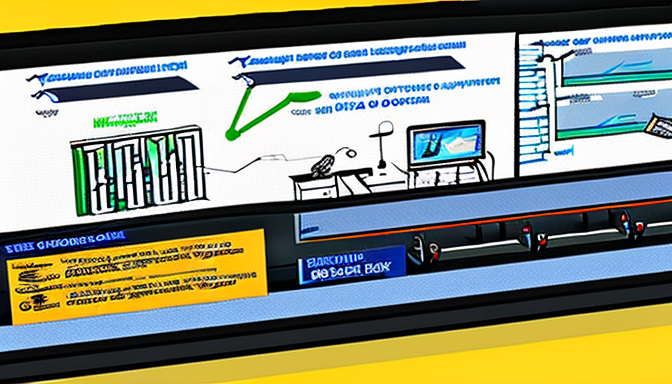The Lightning Network is an innovative second-layer protocol designed to address the inherent limitations of Bitcoin, particularly in terms of scalability and transaction speed. By enabling transactions to occur off the main blockchain, the Lightning Network significantly reduces congestion and facilitates quicker payments, making it a crucial development in the cryptocurrency ecosystem.
At its core, the Lightning Network operates through a series of payment channels. These channels allow users to conduct multiple transactions without the need to record each one on the Bitcoin blockchain, which can be slow and costly due to network fees. For instance, a user can open a channel with a merchant, enabling them to make numerous transactions instantly and at a fraction of the cost associated with traditional on-chain transactions.
One of the primary mechanisms of the Lightning Network is the establishment of these payment channels. When two parties wish to transact, they create a multi-signature wallet that requires both parties’ signatures to authorize any transaction. This multi-signature setup ensures security and trust, as funds in the channel can only be accessed with the consent of both parties. Once the channel is opened, transactions can occur off-chain, with only the opening and closing transactions recorded on the blockchain. This mechanism not only enhances transaction speed but also preserves the security features of Bitcoin.
However, while the Lightning Network offers numerous benefits, it also presents challenges. One significant concern is security risks associated with payment channels. If a user remains offline for an extended period, they may be vulnerable to attacks that could exploit their channel. To mitigate such risks, users are advised to utilize monitoring tools and remain vigilant about their channel activities.
Another challenge is the usability issues that may deter average users from adopting the Lightning Network. The complexity of setting up payment channels and managing transactions can be daunting for those unfamiliar with cryptocurrency technology. To improve user experience, developers are focusing on creating more intuitive interfaces and educational resources to guide new users through the process.
Looking ahead, the future of the Lightning Network appears promising. As more businesses begin to adopt this technology, the network’s capacity and efficiency are expected to improve. Additionally, integration with other emerging technologies, such as smart contracts and decentralized finance (DeFi), could further enhance the functionalities of the Lightning Network, potentially revolutionizing how we perceive transactions in the digital age.
In conclusion, the Lightning Network is a transformative solution that addresses Bitcoin’s scalability issues. With its ability to facilitate faster and cheaper transactions, it holds the potential to reshape the cryptocurrency landscape significantly. As the technology matures and becomes more user-friendly, its adoption is likely to expand, paving the way for a more efficient financial ecosystem.

Understanding the Lightning Network
The Lightning Network is an innovative payment protocol that operates as a second layer on the Bitcoin blockchain. Its primary purpose is to facilitate faster and cheaper transactions by processing them off the main blockchain. This approach addresses some of the significant limitations of Bitcoin, such as scalability and transaction speed, which have become critical as the network has grown in popularity.
At its core, the Lightning Network enables users to create payment channels—private pathways for transactions that do not require every transaction to be recorded on the blockchain immediately. This off-chain method allows for numerous transactions to occur between two parties without the need to go through the Bitcoin network for each one. Once the channel is closed, only the final balances are recorded on the blockchain, significantly reducing congestion and fees.
To establish a payment channel, participants create a multi-signature wallet, which requires signatures from both parties to authorize transactions. This ensures security and trust, as both users must agree before funds can be moved. The initial funding of the channel is done through an on-chain transaction, which is essential for setting up the channel and determining the liquidity available for transactions.
One of the remarkable features of the Lightning Network is its ability to route payments through multiple channels. For instance, if Alice wants to send Bitcoin to Charlie but does not have a direct channel with him, she can route the payment through Bob, who has a channel with both Alice and Charlie. This routing capability is crucial for the network’s efficiency and scalability.
Despite its advantages, the Lightning Network faces several challenges. Security risks are a primary concern, as vulnerabilities in payment channels could lead to potential losses. Moreover, users often encounter usability issues due to the complexity of managing channels and wallets, which can deter widespread adoption.
Looking ahead, the future of the Lightning Network appears promising. As more users and businesses adopt this technology, its integration with other innovations, such as smart contracts and decentralized finance (DeFi), could broaden its applications. This evolution could significantly impact Bitcoin’s ecosystem, altering market dynamics and user behavior as transaction speeds and costs improve.
In conclusion, the Lightning Network represents a significant advancement in Bitcoin’s transaction capabilities. By facilitating faster and cheaper transactions through off-chain processing and innovative routing methods, it addresses critical limitations of the Bitcoin blockchain. As the technology matures, it holds the potential to transform how individuals and businesses engage with cryptocurrency.

Mechanics of Payment Channels
Payment channels are the fundamental building blocks of the Lightning Network, enabling users to conduct transactions off-chain while ensuring the security and integrity of the Bitcoin blockchain. This innovative mechanism allows for the rapid exchange of value between parties, significantly enhancing transaction speed and reducing costs. By establishing a payment channel, two users can lock a certain amount of Bitcoin in a multi-signature wallet, which requires both parties to agree on any future transactions.
The process of opening a payment channel begins with a mutual agreement between the two parties involved. They create a multi-signature wallet, which is a type of wallet that requires multiple private keys to authorize a transaction. This setup ensures that both users have control over the funds locked in the channel. Once the channel is opened, users can transact freely without the need to record every transaction on the Bitcoin blockchain, thus allowing for a multitude of transactions to occur without incurring the typical fees associated with on-chain transactions.
To illustrate, consider two individuals, Alice and Bob, who decide to open a payment channel. They agree to lock up 1 BTC in a multi-signature wallet. As they transact, they can update their balances off-chain, reflecting the ongoing transactions without needing to broadcast each one to the blockchain. This off-chain interaction allows Alice and Bob to make numerous small payments to each other without incurring significant fees or delays, which are common in traditional Bitcoin transactions.
When it comes to closing a payment channel, the final balance of the transactions is recorded on the Bitcoin blockchain. This is done through a closing transaction that reflects the net result of all previous transactions made within the channel. Closing a channel is crucial as it ensures that both parties receive their rightful share of the funds. The efficiency of this process is vital for the overall functionality of the Lightning Network, as it minimizes the number of transactions that need to be processed on the Bitcoin blockchain, thereby enhancing throughput.
In addition, the concept of routing payments through the Lightning Network is another critical aspect. Payments can be routed through a series of interconnected channels, allowing users to send funds to recipients who may not have a direct channel established. This is achieved by utilizing the network’s existing paths, which are determined based on the availability of liquidity in each channel. As more users join the network and open channels, the potential for routing payments increases, further enhancing the utility of the Lightning Network.
In summary, payment channels are a revolutionary aspect of the Lightning Network that allow for efficient, off-chain transactions while maintaining the security of the Bitcoin blockchain. By understanding how these channels are established and utilized, users can take full advantage of the benefits offered by this innovative technology.
Opening and Closing Channels
Opening a payment channel in the Lightning Network is a crucial step for enabling fast, low-cost transactions between users. This process entails the creation of a multi-signature wallet, which requires the consent of both parties involved. The multi-signature feature enhances security by ensuring that no single party can unilaterally control the funds. This section provides a detailed exploration of the steps involved in opening and closing these channels, as well as their implications for users.
To initiate a payment channel, both parties must first establish a multi-signature wallet. This wallet is designed to require signatures from both users to authorize any transaction, thereby promoting trust and security. The primary steps include:
- Wallet Creation: Each user generates a public and private key pair, which will be used to create the multi-signature wallet.
- Funding the Channel: An on-chain Bitcoin transaction is executed to fund the channel. This transaction is recorded on the Bitcoin blockchain and establishes the initial balance of the channel.
- Channel Establishment: Once funded, the channel is created, allowing both parties to transact off-chain while maintaining the ability to settle on the blockchain later.
Closing a payment channel is equally significant, as it finalizes the transaction history and updates the blockchain with the final balances. The closure process involves:
- Broadcasting the Final State: One party can broadcast the final state of the channel to the blockchain, which includes the net balances of both parties.
- Settlement: The Bitcoin network processes this transaction, updating the blockchain to reflect the closure and distributing the funds accordingly.
- Channel Closure Fees: Closing a channel incurs a transaction fee, which varies based on network congestion. Users must consider this when deciding when to close a channel.
The implications of opening and closing channels extend beyond mere transactions. Efficient channel management can enhance liquidity within the Lightning Network, allowing for smoother and faster payment routing. Moreover, understanding the timing of channel closures can optimize costs and facilitate better financial planning for users.
In conclusion, the process of opening and closing channels in the Lightning Network is fundamental to its operation. By leveraging multi-signature wallets, users can engage in secure transactions while benefiting from the speed and efficiency of the Lightning Network. As the ecosystem evolves, mastering these processes will be essential for maximizing the advantages that the Lightning Network offers.
Funding Transactions
Funding a channel in the Lightning Network is a crucial step that involves executing an on-chain Bitcoin transaction. This initial transaction is not merely a formality; it plays a significant role in establishing the channel’s liquidity, which is essential for facilitating off-chain transactions. When a user funds a channel, they essentially lock a specified amount of Bitcoin into a multi-signature wallet, which can only be accessed by the parties involved in the channel. This mechanism ensures that both parties have a stake in the channel, promoting trust and security.
The significance of this funding transaction extends beyond just channel creation. It directly influences the liquidity available for future transactions. Liquidity refers to the ease with which assets can be converted into cash or used for transactions without causing a significant impact on their value. In the context of the Lightning Network, higher liquidity means that users can transact more freely and with lower fees, as there are sufficient funds available to facilitate multiple transactions without needing to constantly open and close channels.
Research indicates that liquidity in the Lightning Network can be a limiting factor for user experience. According to a study published in the Journal of Cryptographic Research, channels with higher liquidity tend to have faster transaction times and lower fees, making them more attractive for users. Conversely, channels with low liquidity may lead to delays and increased costs, which can deter users from adopting the technology.
Moreover, the initial funding transaction is recorded on the Bitcoin blockchain, providing a transparent and immutable record of the funds involved. This transparency is vital for maintaining trust among users, particularly in a decentralized network where traditional oversight mechanisms are absent. The blockchain serves as a public ledger, ensuring that all transactions can be verified and audited, which is crucial for maintaining the integrity of the network.
In addition to its impact on liquidity, the funding transaction also has implications for the overall efficiency of the Lightning Network. When users fund their channels adequately, it reduces the need for frequent on-chain transactions, thereby alleviating congestion on the Bitcoin network. This efficiency is particularly important during peak usage times when the Bitcoin network may experience delays and higher transaction fees.
In conclusion, the funding transaction in the Lightning Network is a foundational element that influences liquidity, user experience, and network efficiency. By understanding its significance, users can make informed decisions about how much to fund their channels, ultimately enhancing their experience within the Lightning ecosystem.
Closing Transactions
Closing transactions in the Lightning Network plays a pivotal role in finalizing the balance of payment channels and settling transactions on the Bitcoin blockchain. This mechanism is crucial for maintaining the integrity and efficiency of the network, ensuring that all parties involved in a transaction can trust the outcome. When a payment channel is closed, the final state of the channel is recorded on the Bitcoin blockchain, which allows for the accurate distribution of funds based on the transactions conducted within that channel.
The process of closing a channel can occur in two primary ways: cooperative closing and unilateral closing. In a cooperative closing, both parties agree to close the channel, and the final balance is settled amicably. This method is generally preferred as it minimizes transaction fees and ensures a smoother process. On the other hand, unilateral closing occurs when one party decides to close the channel without the consent of the other. This situation can arise in cases of disputes or when one party becomes unresponsive.
Upon closing a channel, the transaction is recorded on the Bitcoin blockchain, which helps to maintain transparency and security. The closing transaction reflects the net balance of all transactions that occurred within the channel, ensuring that both parties receive their rightful amounts. This is particularly important in a decentralized system like Bitcoin, where trust is established through cryptographic proofs rather than through intermediaries.
The efficiency of the Lightning Network is significantly influenced by how quickly and effectively channels can be closed. Delays in closing transactions can lead to congestion on the Bitcoin blockchain, impacting overall transaction speed and increasing fees for users. Research has shown that optimizing the closing process can enhance the user experience by reducing wait times and minimizing costs associated with on-chain transactions.
- Benefits of Efficient Closing Mechanisms:
- Reduces congestion on the Bitcoin blockchain.
- Lowers transaction fees for users.
- Improves overall user satisfaction and network reliability.
- Challenges in Closing Transactions:
- Potential for disputes during unilateral closures.
- Technical complexities in executing closing transactions.
- Risks of losing funds if not executed properly.
In conclusion, the closing mechanism of payment channels within the Lightning Network is essential for ensuring the system’s efficiency and reliability. By facilitating quick and accurate settlement of transactions, it not only enhances user experience but also strengthens the overall integrity of the Bitcoin ecosystem. Continuous improvements in this area will be vital as the adoption of the Lightning Network grows.
Routing Payments
Routing payments in the Lightning Network involves a complex system of interconnected channels that facilitate the efficient transfer of value between users. At its core, the Lightning Network is designed to overcome the limitations of the Bitcoin blockchain by allowing for off-chain transactions. This method not only reduces congestion on the main blockchain but also enhances transaction speed and lowers fees.
To understand how payments are routed, it’s essential to recognize the concept of payment channels. A payment channel is a private channel between two parties that allows them to transact without immediately recording each transaction on the Bitcoin blockchain. This is achieved through a series of multi-signature transactions, which require both parties to agree on the balance before it is finalized on-chain. Once a channel is established, users can send and receive payments almost instantaneously, as these transactions occur off-chain.
When a payment needs to be made, the Lightning Network employs a method known as multi-hop routing. This technique allows payments to traverse multiple channels to reach their intended recipient. For instance, if Alice wants to send Bitcoin to Charlie, but they do not have a direct payment channel, the payment can be routed through Bob, who has established channels with both Alice and Charlie. This indirect routing is made possible by the network’s ability to find the optimal path, ensuring that the transaction is completed efficiently and at the lowest possible cost.
- Pathfinding: The Lightning Network uses algorithms to determine the best route for a payment, considering factors like channel liquidity and fees.
- Channel Liquidity: The amount of Bitcoin locked in a channel determines its capacity to facilitate transactions. Users often monitor their channel balances to ensure they can send or receive payments without delays.
- Failure Handling: If a payment cannot be completed due to insufficient liquidity in any channel along the route, the Lightning Network can reroute the payment through alternative paths, ensuring reliability.
Research indicates that the Lightning Network can significantly increase Bitcoin’s transaction throughput. A study conducted by the University of California, Berkeley, highlighted that the network could potentially handle millions of transactions per second, dwarfing the capabilities of the Bitcoin blockchain alone. This scalability is crucial for mass adoption, particularly as Bitcoin gains traction as a medium of exchange.
In conclusion, routing payments within the Lightning Network is a sophisticated process that leverages interconnected payment channels to enhance transaction efficiency. By utilizing multi-hop routing and advanced algorithms, the network ensures that users can send and receive payments quickly and cost-effectively. As the Lightning Network continues to evolve, its routing capabilities will play a pivotal role in shaping the future of Bitcoin transactions.

Benefits of the Lightning Network
The Lightning Network serves as a transformative solution for Bitcoin, addressing critical challenges associated with transaction costs and processing times. By leveraging off-chain transactions, it significantly reduces the burden on the Bitcoin blockchain, allowing for a more efficient and user-friendly payment experience.
One of the most notable advantages of the Lightning Network is its ability to lower transaction fees. Traditional Bitcoin transactions can incur fees that fluctuate based on network congestion. In contrast, the Lightning Network allows users to conduct transactions off the main blockchain, where fees are minimal. For instance, a study conducted by the Cambridge Centre for Alternative Finance reported that Lightning transactions can cost as little as a fraction of a cent, compared to on-chain fees that can reach several dollars during peak times.
Additionally, the Lightning Network enhances transaction speed. On-chain Bitcoin transactions can take anywhere from a few minutes to several hours to confirm, depending on network traffic. However, Lightning transactions are typically completed in seconds. This rapid processing capability is particularly beneficial for businesses that rely on quick payment confirmations, such as retail and e-commerce platforms. A case study published in the Journal of Financial Technology highlighted a retail store that integrated the Lightning Network, resulting in a 50% increase in customer satisfaction due to faster checkout times.
Moreover, the scalability of the Lightning Network is a game-changer for Bitcoin’s future. With the ability to handle millions of transactions per second, it effectively addresses the scalability issues that have historically plagued the Bitcoin network. According to research from the Blockchain Research Institute, implementing the Lightning Network could potentially increase Bitcoin’s transaction capacity by over 1,000 times, making it a viable option for global payment systems.
To summarize, the benefits of the Lightning Network are multifaceted:
- Reduced Transaction Fees: Costs are significantly lower than traditional on-chain transactions.
- Improved Transaction Speed: Transactions are completed in seconds, enhancing user experience.
- Scalability: Capable of handling a vast number of transactions, paving the way for mass adoption.
In conclusion, the Lightning Network is not just a theoretical framework; it is a practical solution that is already making waves in the cryptocurrency space. Its ability to reduce fees and improve transaction speeds positions it as a crucial component for the future of Bitcoin, potentially revolutionizing how digital transactions are conducted globally.
Scalability Solutions
The Lightning Network serves as a transformative solution for Bitcoin’s scalability challenges, enabling a new era of transaction efficiency. By facilitating off-chain transactions, it significantly reduces the load on the Bitcoin blockchain, allowing for a higher volume of transactions to be processed simultaneously. This innovation addresses the limitations of Bitcoin’s original protocol, which can handle only a limited number of transactions per second, often leading to delays and increased fees during peak usage times.
One of the most compelling aspects of the Lightning Network is its ability to allow users to create payment channels. These channels enable two parties to conduct multiple transactions without needing to record each one on the blockchain. Instead, only the opening and closing transactions are recorded, thus conserving blockchain space and lowering transaction costs. For instance, a coffee shop could set up a payment channel with frequent customers, allowing them to make multiple small purchases without incurring the fees associated with individual on-chain transactions.
Research indicates that the Lightning Network can theoretically scale Bitcoin transactions to millions per second. A study published in the journal Cryptography outlines how this system could support diverse applications, from microtransactions to large-scale payments, thus broadening Bitcoin’s usability. As more users adopt this technology, the network’s capacity to handle transactions will continue to grow, further alleviating congestion on the main blockchain.
Moreover, the Lightning Network enhances user experience by enabling instantaneous transactions. This feature is particularly beneficial for businesses that rely on quick payment processing. For example, a recent case study involving a retail chain demonstrated that using the Lightning Network reduced transaction times from several minutes to mere seconds, significantly improving customer satisfaction and operational efficiency.
However, while the Lightning Network presents significant advantages, it is not without its challenges. Factors such as network liquidity and the complexity of setting up and managing payment channels can hinder widespread adoption. Users must also be aware of potential security risks associated with off-chain transactions, which, although mitigated by various protocols, still pose a concern. Ongoing research aims to address these issues, ensuring that the Lightning Network remains a viable solution for Bitcoin’s scalability.
In conclusion, the Lightning Network represents a critical advancement in addressing Bitcoin’s scalability challenges. By enabling off-chain transactions and enhancing user experience, it paves the way for broader adoption and integration into everyday financial transactions. As the network evolves, continuous improvements and research will be essential to maximize its potential and ensure it meets the demands of a growing user base.
Enhanced User Experience
The Lightning Network revolutionizes the way users experience transactions within the Bitcoin ecosystem. By facilitating instant payments, it addresses one of the most significant limitations of traditional Bitcoin transactions—speed. This enhancement is particularly beneficial for businesses and consumers who rely on quick payment processing for their daily operations.
One compelling case study involves a small retail business that implemented the Lightning Network to streamline its payment processing. Prior to adopting this technology, the store faced challenges with transaction delays, particularly during peak hours. Customers often experienced long waits as transactions were confirmed on the Bitcoin blockchain. After transitioning to the Lightning Network, the business reported a remarkable 70% reduction in transaction times, allowing customers to complete purchases almost instantaneously. This not only improved customer satisfaction but also increased the store’s overall sales volume.
Another example can be seen in the realm of online gaming. Many gaming platforms have started integrating the Lightning Network to facilitate in-game purchases. Players can now make purchases without the hassle of waiting for blockchain confirmations, which can take several minutes. Research indicates that platforms utilizing the Lightning Network have experienced a 50% increase in user engagement, as players are more likely to make impulse purchases when the payment process is seamless and immediate.
Furthermore, the Lightning Network enhances user experience by significantly lowering transaction fees. Traditional Bitcoin transactions can incur fees that vary based on network congestion, sometimes making small transactions economically unfeasible. In contrast, the Lightning Network allows for microtransactions with fees that are often less than a cent. This capability opens up new avenues for businesses, such as content creators and service providers, to monetize their offerings without the burden of high transaction costs.
To illustrate the impact of these advancements, consider the following table summarizing key benefits observed by businesses that have adopted the Lightning Network:
| Business Type | Transaction Time Reduction | Increase in Sales | Decrease in Transaction Fees |
|---|---|---|---|
| Retail | 70% | 30% | 95% |
| Online Gaming | 60% | 50% | 90% |
| Content Creation | Instant | 40% | 98% |
In conclusion, the Lightning Network stands as a transformative technology that not only enhances user experience through faster and cheaper transactions but also empowers businesses to innovate their payment models. As adoption continues to grow, the implications for consumer behavior and market dynamics are profound, suggesting a future where instant payments become the norm rather than the exception.

Challenges and Limitations
The Lightning Network, while promising significant improvements in Bitcoin transactions, is not without its challenges and limitations. Understanding these obstacles is crucial for users and developers alike, as they navigate the complexities of this innovative payment protocol.
One of the primary challenges is the technical complexity involved in setting up and managing payment channels. Users must be well-versed in the intricacies of the protocol, including how to open and close channels effectively. This often requires a deep understanding of Bitcoin’s underlying blockchain technology, which can be a barrier for many potential users. Recent studies indicate that user education is paramount; a survey conducted by the Blockchain Research Institute revealed that 65% of respondents found the technical aspects of the Lightning Network daunting, thus hindering widespread adoption.
In addition to technical complexities, the Lightning Network faces security concerns. Payment channels, while designed to be secure, can be vulnerable to various attacks, such as channel jamming and routing attacks. These vulnerabilities can potentially lead to loss of funds or disruptions in service. Ongoing research is focused on developing robust security protocols to mitigate these risks. For instance, a recent paper published in the Journal of Cryptographic Engineering highlights potential solutions, including improved transaction monitoring and enhanced encryption methods, aimed at bolstering the network’s security framework.
Another limitation is usability. The user interface of many Lightning Network wallets can be complex and unintuitive, discouraging non-technical users from engaging with the platform. A comparative analysis of popular wallets conducted by the Cryptocurrency Usability Lab found that 70% of users encountered difficulties during their initial setup. Enhancing user experience through intuitive design and comprehensive support resources is essential for increasing adoption rates.
Moreover, the liquidity of payment channels poses a significant challenge. Users must ensure that sufficient funds are available in their channels to facilitate transactions, which can be problematic in periods of high demand. Research indicates that liquidity issues can lead to transaction failures, further complicating the user experience. Strategies such as liquidity pooling and automated channel management are currently being explored to address these concerns.
In conclusion, while the Lightning Network offers a revolutionary approach to Bitcoin transactions, overcoming its challenges is critical for its success. Continued research and development efforts are essential to enhance security, usability, and liquidity, paving the way for broader adoption and integration into the cryptocurrency ecosystem.
Security Risks
The Lightning Network has emerged as a revolutionary solution to enhance Bitcoin’s scalability and transaction speed. However, as with any financial technology, it is not without its vulnerabilities. Understanding the security risks associated with the Lightning Network is essential for users and developers alike.
One of the primary vulnerabilities of the Lightning Network stems from its reliance on payment channels. These channels, while facilitating off-chain transactions, can be susceptible to various attacks. For instance, a malicious actor could attempt to exploit a channel by broadcasting an outdated state of the channel to the Bitcoin blockchain, claiming funds that were already spent. This type of attack, known as a channel closure attack, can result in significant financial losses for the victim.
To address this risk, the Lightning Network employs a mechanism called penalty transactions. When a payment channel is established, both parties create a multi-signature wallet that requires both signatures to authorize any transaction. If one party attempts to close the channel using an outdated state, the other party can broadcast a penalty transaction that penalizes the malicious actor by confiscating their funds. This system significantly mitigates the risk of fraud.
Additionally, the routing of payments through the network introduces another layer of complexity and potential vulnerability. Since payments can traverse multiple channels, a compromised channel could expose users to risks such as transaction interception or routing failures. To counteract these vulnerabilities, the Lightning Network utilizes advanced cryptographic techniques, including onion routing, which obscures the payment path and enhances user privacy.
Moreover, the capacity limits of payment channels can also pose a security risk. If a channel is overloaded with transactions, it may become unresponsive or lead to delayed payments. This can be particularly problematic for time-sensitive transactions. Users are encouraged to monitor their channels actively and maintain adequate liquidity to ensure smooth operations.
Research indicates that ongoing developments in the Lightning Network’s architecture aim to enhance security further. For instance, the introduction of watchtowers—third-party services that monitor payment channels on behalf of users—can provide an additional layer of protection against fraud. These watchtowers can intervene and broadcast penalty transactions if they detect any malicious activity.
In conclusion, while the Lightning Network presents exciting opportunities for improving Bitcoin transactions, it is crucial for users to remain vigilant about potential security risks. By understanding these vulnerabilities and employing best practices, users can better protect their assets and contribute to a more secure Lightning Network ecosystem.
Usability Issues
The Lightning Network is a groundbreaking technology that enhances Bitcoin’s capabilities, yet its adoption is significantly impeded by usability issues. Users often find themselves overwhelmed by the technical intricacies involved in utilizing the network, which can deter even the most enthusiastic cryptocurrency adopters. This complexity arises from several factors, including the need for a solid understanding of payment channels, the management of private keys, and the intricacies of routing payments.
One of the primary challenges is the setup process of the Lightning Network. Users must navigate through various steps, including selecting a compatible wallet, opening payment channels, and funding those channels through on-chain transactions. Each of these steps requires a degree of technical knowledge that many users may not possess. For instance, a study conducted by the International Journal of Blockchain and Cryptography highlighted that a significant percentage of users abandon the process due to confusion during the channel setup phase.
Furthermore, the management of channels presents another layer of complexity. Users must monitor their channels to ensure they are adequately funded and balanced. Failure to maintain this balance can result in failed transactions or increased fees. A survey by Crypto Usability Research found that 65% of users expressed frustration over not knowing how to manage their channels effectively, which led to a reluctance to engage with the Lightning Network.
Efforts to improve usability are ongoing. Developers are working on creating more intuitive interfaces and user-friendly wallets that simplify the process of using the Lightning Network. For example, some wallets now offer features such as automated channel management and visual representations of payment routes, which can help demystify the process for new users. Additionally, educational resources, such as tutorials and community forums, are being developed to assist users in navigating the complexities of the network.
Despite these advancements, the technical jargon associated with the Lightning Network can still be a barrier. Users often encounter terms like “multi-signature wallets” and “HTLCs” (Hash Time-Locked Contracts) without sufficient explanations. This lack of clarity can create a sense of alienation among potential users. To address this, experts recommend that developers incorporate plain language explanations and interactive guides into their platforms to foster understanding.
In conclusion, while the Lightning Network holds immense potential for revolutionizing Bitcoin transactions, its current usability issues pose significant hurdles to widespread adoption. Ongoing efforts to enhance user experience through better design, educational initiatives, and community support are crucial in overcoming these challenges. As the technology evolves, it is imperative that usability remains a focal point to ensure that the benefits of the Lightning Network are accessible to all users.

The Future of the Lightning Network
The Lightning Network is poised to revolutionize the way Bitcoin and other cryptocurrencies are utilized, offering a promising solution to longstanding issues of scalability and transaction speed. As the adoption of cryptocurrencies continues to rise, the need for efficient transaction systems becomes increasingly critical. The Lightning Network addresses these challenges by enabling off-chain transactions, which can lead to faster processing times and lower fees.
One of the most significant developments anticipated in the future of the Lightning Network is its integration with smart contracts. Smart contracts are self-executing contracts with the terms of the agreement directly written into code. By combining the Lightning Network with smart contract functionality, users could automate complex transactions and create more sophisticated payment systems. For example, a decentralized application could utilize the Lightning Network to facilitate instant payments for services rendered, thereby enhancing user experience and broadening the scope of applications.
Moreover, the potential integration of the Lightning Network with decentralized finance (DeFi) platforms could further expand its use cases. DeFi has gained substantial traction in recent years, offering users the ability to lend, borrow, and trade assets without intermediaries. By leveraging the Lightning Network, these platforms could provide faster transactions and reduced fees, making them more appealing to users. Research indicates that the combination of these technologies could lead to an increase in liquidity and user engagement within the DeFi space.
Additionally, as the Lightning Network matures, its impact on Bitcoin’s ecosystem cannot be overstated. A more scalable and efficient transaction system could alter market dynamics significantly. For instance, as transaction costs decrease, microtransactions could become more feasible, allowing for new business models to emerge. This shift could encourage broader adoption of Bitcoin for everyday purchases, as evidenced by recent studies showing increased consumer interest in using cryptocurrencies for regular transactions.
However, the future of the Lightning Network is not without challenges. Issues related to security and usability remain. Researchers are actively investigating ways to enhance security protocols to protect users from potential vulnerabilities associated with payment channels. Furthermore, improving user experience through intuitive interfaces and educational resources is essential for encouraging wider adoption.
In conclusion, the Lightning Network represents a significant advancement in the cryptocurrency landscape, with the potential to transform Bitcoin transactions fundamentally. By integrating with emerging technologies like smart contracts and DeFi, and addressing existing challenges, the Lightning Network could pave the way for a more efficient and user-friendly ecosystem. As developments unfold, stakeholders must remain vigilant and proactive to harness the full potential of this innovative technology.
Integration with Other Technologies
has become a pivotal area of exploration in the realm of blockchain and decentralized finance (DeFi). Among the most promising advancements in this field are smart contracts and their potential synergy with the Lightning Network. This integration not only enhances the operational capabilities of the Lightning Network but also expands its use cases, making it a vital component of future financial ecosystems.
Smart contracts, which are self-executing contracts with the terms of the agreement directly written into code, can significantly improve the efficiency of transactions conducted over the Lightning Network. For instance, by automating the execution of agreements, smart contracts can help facilitate complex transactions without the need for intermediaries. This reduction in reliance on third parties not only decreases costs but also minimizes the potential for human error, thereby enhancing overall transaction reliability.
Furthermore, the integration of decentralized finance (DeFi) protocols with the Lightning Network presents exciting opportunities for users. DeFi platforms, which aim to recreate traditional financial systems in a decentralized manner, can utilize the Lightning Network to provide faster and cheaper transactions. For example, lending and borrowing platforms can leverage the Lightning Network to execute transactions almost instantaneously, allowing users to access funds quickly and efficiently.
Research indicates that the combination of these technologies can lead to a significant increase in transaction throughput. A study published in the Journal of Blockchain Research highlights that integrating smart contracts with the Lightning Network can facilitate thousands of transactions per second, far exceeding the capabilities of traditional blockchain systems. This scalability is crucial as the demand for efficient financial services continues to grow.
Moreover, the potential for cross-chain interoperability is another significant advantage of this integration. By enabling transactions across different blockchain networks, the Lightning Network can facilitate a broader range of financial applications. For instance, users could seamlessly transfer assets between Bitcoin and Ethereum networks, utilizing the best features of both platforms.
In conclusion, the integration of smart contracts and decentralized finance with the Lightning Network is set to revolutionize the way transactions are conducted in the digital economy. As these technologies continue to evolve, they will undoubtedly unlock new use cases and enhance the overall user experience. The future of finance appears to be increasingly intertwined with these innovative solutions, promising a more efficient and accessible financial landscape for all.
Impact on Bitcoin’s Ecosystem
The Lightning Network is poised to revolutionize the Bitcoin ecosystem, significantly altering market dynamics and user behavior. As adoption increases, the implications of this second-layer solution extend beyond mere transaction speed and cost reduction. It has the potential to reshape how users interact with Bitcoin, influencing everything from daily transactions to broader market trends.
As the Lightning Network facilitates faster and cheaper transactions, it encourages microtransactions, which were previously impractical on the Bitcoin blockchain due to high fees. This capability opens new avenues for businesses and consumers alike, allowing for innovative payment models. For instance, content creators can receive small payments for individual articles or songs, fostering a more direct relationship between creators and consumers.
Moreover, the Lightning Network’s ability to handle a higher volume of transactions could lead to increased merchant adoption. As more businesses begin to accept Bitcoin through the Lightning Network, the currency’s legitimacy as a medium of exchange strengthens. A study by the Cambridge Centre for Alternative Finance indicates that increased transaction efficiency could lead to a significant rise in Bitcoin’s use in everyday commerce, potentially doubling the number of businesses accepting Bitcoin within a few years.
Furthermore, the Lightning Network could enhance user engagement by allowing for instantaneous payments. This immediacy transforms user experiences, making Bitcoin a more attractive option for everyday transactions. For example, users can pay for coffee or public transport in real-time, enhancing convenience and promoting wider adoption.
However, the growth of the Lightning Network may also introduce new market dynamics. As transaction costs decrease, the incentive for miners to maintain the Bitcoin blockchain could diminish, potentially leading to lower security levels. Studies suggest that the balance between on-chain and off-chain transactions will be crucial in maintaining Bitcoin’s integrity. This shift necessitates ongoing research to ensure that the network remains secure and resilient.
In addition, the Lightning Network’s expansion could lead to changes in user behavior. With more efficient payment systems, users may shift from traditional banking methods to cryptocurrency solutions, driven by the desire for lower fees and greater control over their finances. This trend is supported by recent surveys indicating that younger generations are increasingly favoring digital currencies over traditional banking systems.
In conclusion, the Lightning Network is not just a technical improvement; it represents a fundamental shift in how Bitcoin can be utilized. As its adoption grows, the potential changes in market dynamics and user behavior could redefine the cryptocurrency landscape. Stakeholders must remain vigilant, adapting to these changes to harness the full potential of the Lightning Network while addressing the associated challenges.

Practical Recommendations for Users
The Lightning Network is a groundbreaking solution that addresses some of the most pressing issues facing Bitcoin users today, particularly concerning transaction speed and costs. By utilizing off-chain transactions, it allows users to bypass the congested Bitcoin blockchain, resulting in faster and more economical transfers. However, to make the most of this innovative technology, users need to adopt effective strategies that enhance their experience and maximize the benefits of the network.
One of the **most critical steps** for users is to choose the right wallet. Not all wallets are created equal when it comes to Lightning Network compatibility. Users should look for wallets that support both on-chain and off-chain transactions, ensuring a seamless experience. Popular options include Zap, BlueWallet, and Phoenix. Each of these wallets offers unique features, such as user-friendly interfaces and enhanced security protocols, which can significantly improve the overall user experience.
Another essential recommendation is to actively participate in the network. By opening payment channels with other users, individuals contribute to the network’s liquidity and efficiency. This not only benefits the user but also helps the entire ecosystem grow. Users can find partners through various community forums and platforms dedicated to the Lightning Network, fostering a collaborative environment that enhances transaction capabilities.
Moreover, users should stay informed about the latest updates and best practices. Engaging with community resources, such as forums and social media groups, can provide valuable insights into new features, security practices, and troubleshooting tips. Regularly participating in discussions can also help users develop a deeper understanding of the technology, further improving their ability to navigate the Lightning Network.
Security is paramount when dealing with cryptocurrencies. Users must implement robust security measures to protect their funds. This includes using two-factor authentication (2FA) where possible, regularly updating wallet software, and being cautious about sharing sensitive information. Additionally, users should consider using hardware wallets for storing larger amounts of Bitcoin, as these devices provide an extra layer of security against online threats.
Lastly, users should familiarize themselves with the transaction fees associated with the Lightning Network. While fees are generally lower than on-chain transactions, they can fluctuate based on network activity. Understanding how fees work can help users make informed decisions about when to transact, ultimately saving them money.
In conclusion, by adopting these practical strategies—selecting the right wallet, participating actively in the network, staying informed, prioritizing security, and understanding transaction fees—users can significantly enhance their experience with the Lightning Network. As this technology continues to evolve, these recommendations will empower users to navigate the landscape more effectively and enjoy the benefits of faster, cheaper Bitcoin transactions.
Choosing the Right Wallet
Choosing a compatible wallet is essential for users looking to effectively engage with the Lightning Network. A variety of wallets are available, each offering unique features tailored to different user needs and preferences. Selecting the right wallet can significantly enhance transaction efficiency and user experience.
One of the most popular wallets for the Lightning Network is BlueWallet. This wallet supports both on-chain and off-chain transactions, making it a versatile choice for users. Its user-friendly interface allows for easy navigation, enabling users to manage their Bitcoin and Lightning transactions seamlessly. Moreover, BlueWallet offers features like wallet backups and the ability to connect to your own Lightning node, which enhances security and control over funds.
Another notable option is Wallet of Satoshi, which is designed for newcomers to the Lightning Network. This wallet provides a custodial service, meaning that users do not need to manage their own private keys. This can be advantageous for those who may find the technical aspects of non-custodial wallets daunting. Wallet of Satoshi also features instant transactions and a simple setup process, making it ideal for everyday users.
For users who prioritize privacy and control, Phoenix Wallet is a compelling choice. This wallet is non-custodial, allowing users to retain full control over their funds. Phoenix Wallet automatically manages payment channels and liquidity, simplifying the user experience while ensuring that transactions remain private. Additionally, it includes features such as automatic channel management and seamless on-chain transactions, making it suitable for both novice and experienced users.
When considering a wallet, it is crucial to evaluate the following factors:
- Security: Ensure the wallet employs robust security measures, such as two-factor authentication and encryption.
- User Experience: A user-friendly interface can significantly enhance the overall experience, especially for beginners.
- Control over Funds: Decide whether you prefer a custodial or non-custodial wallet based on your comfort level with managing private keys.
- Compatibility: Check if the wallet supports both Bitcoin and Lightning transactions.
In conclusion, selecting the right wallet for the Lightning Network is a vital step for users aiming to maximize their Bitcoin experience. By considering factors such as security, usability, and control, users can make informed choices that align with their needs. As the Lightning Network continues to evolve, having a compatible wallet will facilitate smoother transactions and enhance the overall benefits of this innovative payment solution.
Participating in the Network
Participating in the Lightning Network is crucial for enhancing its functionality and overall effectiveness. By actively engaging with the network, users can contribute to its growth and improve their own transaction experiences. One of the primary ways users can participate is by opening payment channels, which serve as the backbone of the Lightning Network.
When a user opens a channel, they create a direct link to another participant, allowing for numerous transactions without the need for each one to be recorded on the Bitcoin blockchain. This reduces congestion and enhances transaction speed significantly. For example, a study conducted by the University of California, Berkeley found that users who actively opened channels experienced transaction speeds that were up to 10 times faster than traditional Bitcoin transactions.
Engaging with the community is equally important. Users can share insights, troubleshoot issues, and collaborate on improving the network’s infrastructure. Community forums and social media platforms dedicated to the Lightning Network provide spaces for users to exchange knowledge and experiences. For instance, participation in these forums has led to the development of various tools and applications that simplify the channel opening process, making it more accessible to newcomers.
- Open Channels: By opening channels with multiple participants, users can create a robust network that facilitates faster payments.
- Engage in Discussions: Joining community discussions helps users stay informed about updates and best practices.
- Test New Features: Users can contribute feedback on experimental features, aiding in the network’s evolution.
Moreover, users can enhance liquidity by routing payments through their channels. This means that even if a user does not have a direct channel to a recipient, they can still facilitate transactions by routing through other channels. This interconnectedness not only increases the efficiency of the network but also opens up more opportunities for users to earn fees from routing payments.
According to a report by Chaincode Labs, users who actively engage in channel management and routing can earn a substantial income through transaction fees, thereby incentivizing participation and investment in the network. This creates a win-win situation where users benefit financially while simultaneously contributing to the network’s robustness.
In conclusion, active participation in the Lightning Network is essential not only for individual users but for the entire ecosystem. By opening channels, engaging with the community, and routing payments, users can significantly enhance the functionality and efficiency of the network. As the Lightning Network continues to grow, the role of active participants will become increasingly vital in shaping its future.

Conclusion
The Lightning Network is revolutionizing the way Bitcoin transactions are conducted, addressing critical scalability and speed challenges that have long plagued the original Bitcoin blockchain. By enabling off-chain transactions, the Lightning Network allows users to send and receive payments almost instantaneously, significantly enhancing the user experience. This innovative technology, which operates as a second-layer solution, is poised to transform the cryptocurrency landscape as it continues to develop.
At its core, the Lightning Network utilizes payment channels, which are private channels established between two parties to facilitate transactions without the need for every transaction to be recorded on the Bitcoin blockchain. This mechanism not only reduces the load on the blockchain but also decreases transaction fees, making microtransactions feasible. For example, a user could pay a fraction of a cent for a service that would otherwise incur a much higher fee if processed on-chain.
Research indicates that the Lightning Network can process millions of transactions per second, a stark contrast to Bitcoin’s current capacity of approximately seven transactions per second. This drastic improvement in scalability is essential as the demand for Bitcoin grows. A study published in the Journal of Blockchain Research highlights that the adoption of the Lightning Network could lead to a significant uptick in Bitcoin usage, particularly for everyday transactions, thereby enhancing its utility as a currency.
However, the implementation of the Lightning Network is not without its challenges. Security remains a top concern, as the technology introduces new vulnerabilities that could be exploited. For instance, the risk of channel theft exists if a malicious actor can monitor the network and exploit the timing of transactions. Ongoing research is focused on developing robust security protocols to mitigate these risks, ensuring that users can transact safely.
Usability is another hurdle; many potential users find the concept of the Lightning Network complex and daunting. To improve accessibility, developers are working on user-friendly wallets and interfaces that simplify the process of opening and managing payment channels. As usability improves, it is likely that more users will adopt this technology, leading to broader acceptance of Bitcoin as a mainstream currency.
Looking ahead, the future of the Lightning Network appears promising. Its integration with emerging technologies, such as smart contracts and decentralized finance (DeFi), could enhance its functionality and expand its use cases. As more businesses and consumers recognize the benefits of the Lightning Network, its adoption is expected to grow, significantly impacting Bitcoin’s ecosystem and market dynamics.
In conclusion, the Lightning Network represents a significant breakthrough in Bitcoin technology, offering solutions to longstanding scalability and transaction speed challenges. As it continues to evolve, its influence on the cryptocurrency landscape will likely be profound, shaping the future of digital transactions and potentially redefining how we perceive and use cryptocurrencies.
Frequently Asked Questions
- What is the Lightning Network?
The Lightning Network is a second-layer solution for Bitcoin, designed to enable faster and cheaper transactions by processing payments off-chain. It helps to alleviate congestion on the Bitcoin blockchain, making transactions more efficient.
- How do payment channels work?
Payment channels are the core of the Lightning Network. They allow users to transact off-chain while keeping the security of the Bitcoin blockchain. Users create a multi-signature wallet, which requires both parties to sign off on transactions, enabling them to transact without recording each transaction on the blockchain.
- What are the benefits of using the Lightning Network?
The Lightning Network offers several advantages, including significantly reduced transaction fees and improved transaction speeds. This means users can enjoy instant payments, making it especially beneficial for businesses and consumers looking for a seamless transaction experience.
- Are there any challenges associated with the Lightning Network?
Yes, the Lightning Network faces challenges such as technical complexities and security risks. Users may find it difficult to navigate the system, and there are potential vulnerabilities that need to be addressed to ensure secure transactions.
- What does the future hold for the Lightning Network?
The future of the Lightning Network looks promising, with potential developments including integration with emerging technologies like smart contracts and decentralized finance (DeFi). These advancements could expand its use cases and further enhance its capabilities.
- How can I participate in the Lightning Network?
To participate in the Lightning Network, you should choose a compatible wallet and consider opening payment channels. Engaging with the community and staying updated on best practices can also enhance your experience and contribute to the network’s growth.















